Last week’s episode showed that Hulu’s TV adaptation of The Handmaid’s Tale isn’t afraid to take us outside of Offred’s point of view, even if it was previously only in flashback. “The Other Side” has taken things a step further, centring an entire episode around another character, and giving us a new look at what’s happening outside Offred’s world.
All Photos Courtesy Hulu

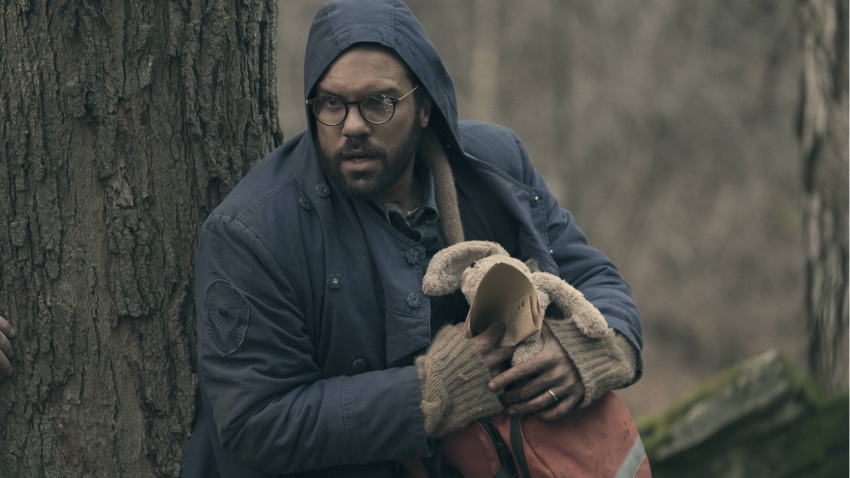
As we learned last week, Luke is alive. This is a major departure from the source material, as Book Offred never learned what happened to her husband, or her daughter Hannah (and, therefore, neither did we). This gives us a chance to rewind things a bit and explore what happened to Luke when he was separated from June and Hannah, as well as how they ended up on the run from the Sons of Jacob in the first place.
Taking place almost entirely in flashback, we see Luke and June fleeing Boston with an unconscious Hannah in the backseat. They’re getting ready to meet a friend of June’s mum, who promised to get them to safety in Canada. He immediately destroys their phones and forces them to surrender their possessions (Luke keeps their family album, despite the risk), ordering them to hide in the trunk while he gets them to a cabin where they can hide out for a few days while he gets them Canadian passports. It’s all very scary… and scarily plausible. It’s easy to imagine oneself in their situation
For a little while, things are normal — or, at least, as close to normal as they can get. June and Hannah make chocolate chip pancakes while Luke brings in wood for the fire. The whole thing is shot with a soft focus, giving everything a rosy, unnatural feel that’s likely thanks in part to Luke’s own nostalgia. This isn’t necessarily how these moments were, but rather how Luke remembers them being. It echoes flashbacks we’ve seen from Offred in previous episodes, giving their separated lives a depressing yet hopeful parallel.
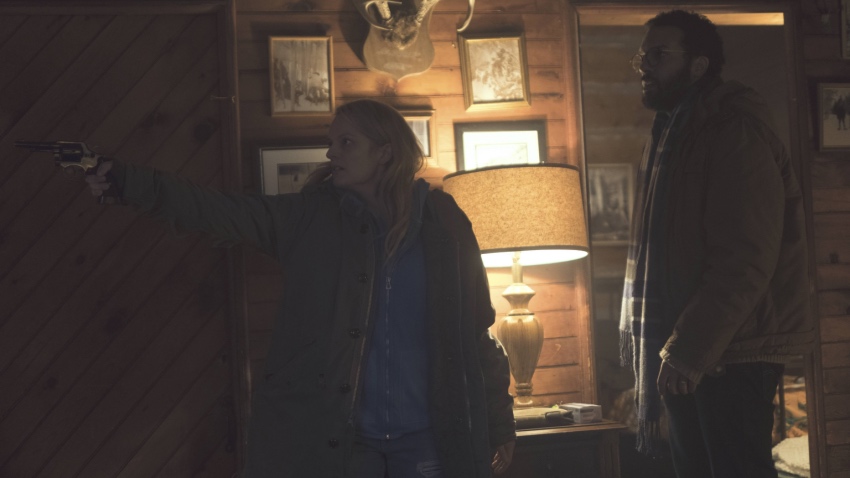
Unfortunately, the harsh light of reality hits them sooner than they’d like. While out throwing stones near the frozen river (big mistake, guys), they encounter a hunter and his dog. The interaction is cordial enough, but Luke and June can’t trust and wait any more and immediately decide to flee… even though they don’t have their Canadian passports. But the passports aren’t coming. The hunter, named Joe, arrives at their cabin to let them know their guide was murdered and the Guardians are out looking for them. He offers them a way out of the area and promises a friend of his will meet them at the border.
One thing the episode does really well is highlight the small moments of kindness amidst all the tragedy. Whether it’s the Guardian who pretends Luke and his family aren’t hiding in the trunk because their guide took his sister to the prom, or the stranger who offers help solely because it’s the right thing to do. It shows that Gilead isn’t all-powerful in the face of human compassion. It reminded me a lot of The Man In The High Castle, another story of humanity’s struggle to survive in a totalitarian state.
Sadly, as we well know, the family never reaches the border. Only this time, instead of following June and Hannah into the woods, we stay behind with Luke, who’s armed with a gun to try and hold off the Guardians. He’s immediately shot — but not killed, because they’re keeping him alive for interrogation. Luke wakes up just as his ambulance flips over, killing the officers on board. From there, we see a bloody and delirious Luke wander through the woods, looking for his wife and daughter (later finding their strewn-about things, which he correctly takes to mean they were apprehended). He takes refuge in a nearby abandoned town, which looks to have been destroyed in retaliation for “gender traitors”, meaning LGBT people.
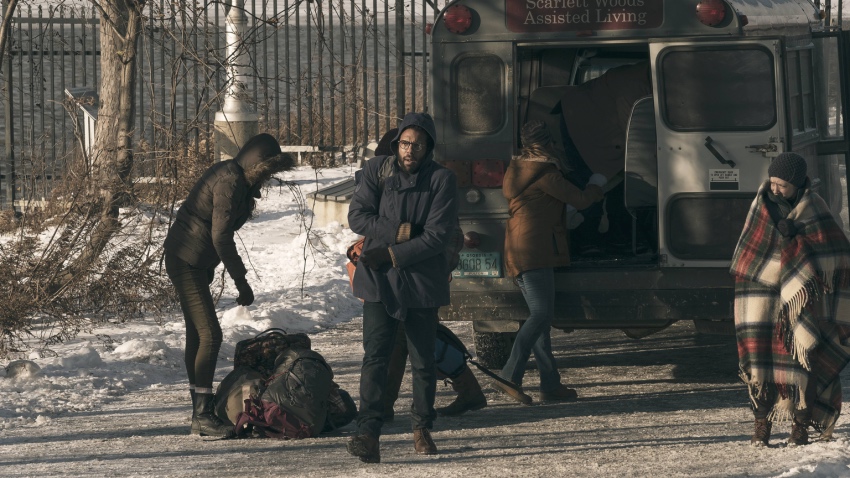
On the verge of death, Luke is rescued by a small group of survivors, which include a gay man and a Catholic nun. It’s a motley crew who has banded together to escape to Canada, while facing certain death if they stay in Gilead. It’s another new perspective, as we’ve normally encountered survivors that Gilead has assigned value to instead of those who are deemed worthless, and instantly killed off. However, one of the survivors still has “value” to Gilead. She’s a mute woman with a red tag on her ear, who we later learn was an early victim of the Handmaids program. She is clearly destroyed psychologically, including night terrors, which suggests she was sort of a guinea pig for the program June was later forced into.
Luke keeps insisting on going back to Boston, going so far as to leave the group when they arrive at their extraction point (as seen above). He makes it, like, 5m before a survivor convinces him to stay by taking him to a church full of hanging victims, showing Luke what happens to people like him who rebel or aren’t of value to Gilead. Resigned to his fate, Luke joins them at the extraction point on the river, pawning off his wedding ring for safe passage. After him and the mute woman make it onboard, the Guardians show up for a raid. It’s unclear how many others in the group survived… but honestly, it didn’t look like any of them made it.
I think, deep down, Luke knew he wasn’t going to go back to Boston. His resolve was admirable, of course, but his main priority was survival. And no one can blame him for that. Some might call him cowardly, but I never would. Any of us would do the same thing if we were in his shoes. If you want to fight another day in the future, you have to make sure you survive today first.
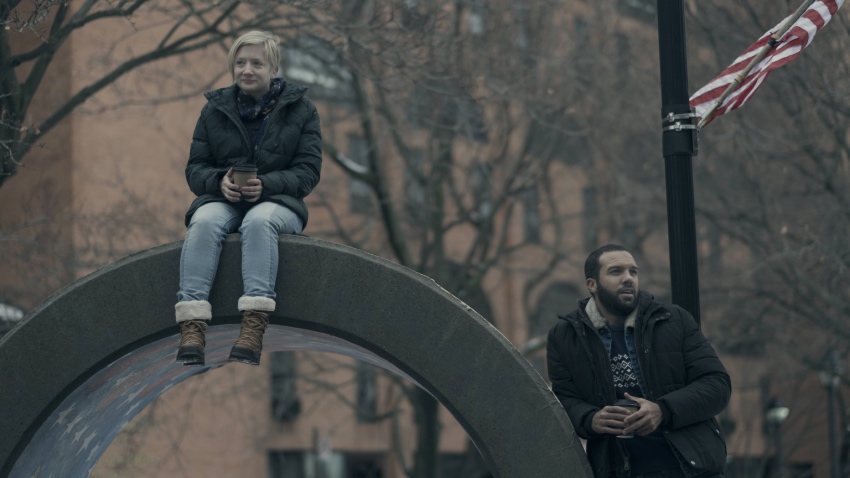
Fast forward three years to the present: Luke is still hanging out with the mute woman, living in “Little America”, a refugee community in Toronto. You get a semblance of how difficult their lives are as refugees: Their supplies are rationed, the power keeps going out… Luke is still using his broken glasses, unable to buy a new pair. But hey, at least they’re free. He’s then brought to the American consulate (or what’s left of it) with some good news: His wife is alive, and she wrote him a note.
This is undoubtedly the best scene we get this week, and one the entire episode was building up to. In true Handmaid’s Tale fashion, the camera stays locked on his face as he processes the message his wife was able to get to him. You can see him memorising every word on the page, every curve of every letter. He’s joyful, terrified, regretful and, above all, hopeful. The episode ends with Offred in her bedroom, determined as ever to survive. For the first time in years, she has hope, too. They both do. All because of seven little words.
“I love you, so much. Save Hannah.”
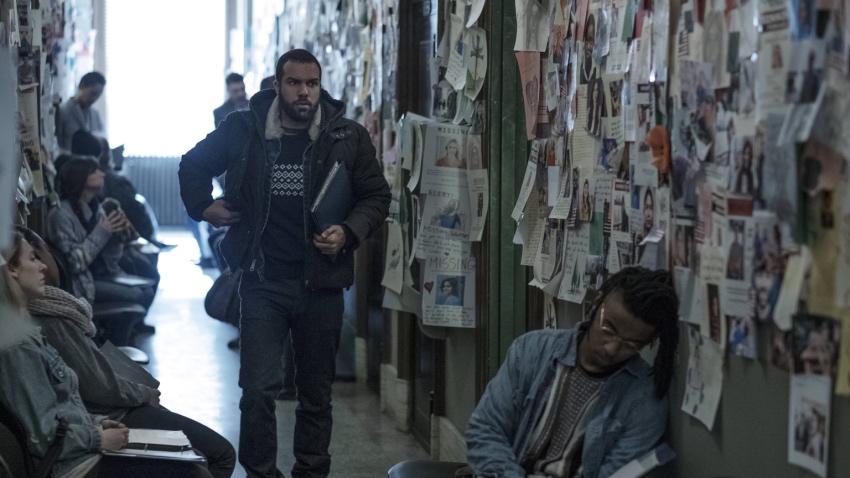
Assorted Musings:
- The “flyers on the wall” scene from the consulate isn’t the most original idea — a lot of movies and shows have used this imagery — but damn if it isn’t effective. Plus, seeing all the people in the hallways, with binders full of information on people they will likely never see again, was especially heartbreaking.
- I understand why the show has ignored the book’s themes of race and eugenics, because they wanted actors of colour without race defining their characters, but it seemed noticeably absent here. In the book, Gilead was a white supremacy group, using religion to justify eugenics so they could remove non-white people from the gene pool. There’s a long history of institutional racism using Christianity as a pretext for subjugation of non-white people, so this made sense. Luke is black, and they have a biracial daughter, yet race is never part of why they’re trying to escape and survive. It’s never even discussed. Not once. The show has de-emphasised race as a vector where oppression happens, which doesn’t fit with our own history. America is not a post-racial society. It feels inappropriate and inauthentic that Gilead somehow is.
